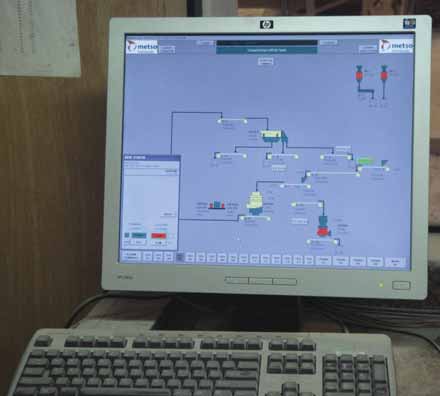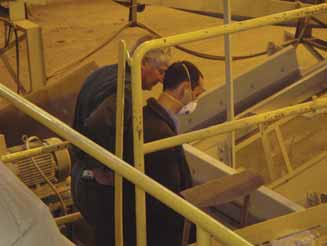Queensland Energy Resources Ltd.
(QERL), based in Queensland, Australia,
is an energy development firm that has
set out to do what no other company has
done—develop a commercial-scale oil
shale production facility.
Oil shale is a fine-grained sedimentary
rock that contains oil in the form of a
chemical compound called kerogen. A
thermal process, commonly known as
“retorting,” is used to extract this compound
from the shale. During retorting,
the shale is heated to 500°C where the
kerogen forms hydrocarbon vapor, which
is then condensed into oil.
QERL has rights to around 15 billion
barrels of oil in situ along the Queensland
coast. Australia has shale oil reserves
in Queensland estimated as high
as 30 billion barrels. Southern Pacific
Petroleum (SPP) tried to develop the
resource (formerly known as the Stuart
project), but several issues brought the
project to a standstill. QERL purchased
the shale oil interests from SPP in 2004.
The challenge is, unlike traditional oil
refineries, shale oil production facilities
are not off-the-shelf solutions. In fact,
while there are a number of demonstration
facilities around the world, there are
no large commercial-scale facilities in
existence.
So, as a first step, QERL must investigate
each piece of equipment needed in
this unique process and evaluate it for its
applicability and efficiency in a commercial
production setting.
“A key part of extracting oil from the
shale is crushing and screening,” said
Chris Anderson, principal mechanical
engineer for QERL. “In order to extract
the maximum amount of oil from the
shale, the material must be crushed to
certain specifications—cubic particles,
good size distribution and minimal
fines,” he explained.
QERL had tested a sizer type crusher,
but wanted to try other approaches. Highperformance
cone crushers are often
used in aggregate applications to produce
cubic particles for certain asphalt
mixes. QERL thought these cone crushers
might be another viable option and
wanted to test them.
 The fully automated Metso facility allows engineers to
quickly change parameters during the course of a test.
The fully automated Metso facility allows engineers to
quickly change parameters during the course of a test.
Testing Challenge
The problem that most companies face
when trying out crushing equipment for a
new process technology is the enormous
time and resource commitment needed
to complete the test of equipment with
the actual material to be processed.
Typically, when a crusher is brought on
site, electrical power must be installed
and a qualified operator has to be located.
Then, after running the test, the finished
material has to be taken off-site for
analysis. If variables for the operation of
the crusher need to be changed, these
changes could take several hours or even
days to reconfigure. And, trying a different
type of crusher could take weeks or
even months.
So, rather than invest these resources
of time and money, QERL shipped 18 tons
of material comprising three different
types of its oil shale to Metso Minerals’
unique crushing and screening test facility
in Milwaukee, Wisconsin, USA.
Here, in a very short time, QERL was
able to run nearly three dozen tests with
different settings and configurations—a
process that would have taken months
using traditional methods.
One of a Kind
Metso says its Minerals Research and
Test Center is the only one of its kind in
the world. The fully automated 30,000-
ft2 indoor facility is configured for lab
testing and full-scale pilot testing of the
company’s cone crushers, horizontal
shaft impactors, and jaw crushers. At the
test center, customers can test their own
material on an HP 100 Cone Crusher, an
NP1007 impactor, a C80 jaw crusher, a
Barmac B3000 Duopactor, and a
GP200S cone crusher, all of which are
typical production machines.
The full-scale crushing plant allows
for a customized circuit design for each
individual customer. Data on product
distribution, tonnage and power requirements
can be collected for the customer’s
specific ore or rock. In addition,
material can be removed from the
process stream at any stage and stored
on-site for additional testing at a later time. This allows preparation of large
batches of material that
can be split for multiple secondary and tertiary crushing configurations.
The test center also is fully automated. This allows test engineers
to quickly change parameters during the course of a test.
“When you want to change a setting or speed, you just type
it into the control system and the circuit reconfigures itself
automatically,” said Scot Szalanski, manager, large cone product
support, Metso Minerals mining group.
Five webcams positioned throughout the facility monitor the
pilot test lines and broadcast results to a secure Web site.
Customers who are unable to travel to the test center can view
the tests on-line in real time.
“Our goal with the webcams is to incorporate digital recording
so we can provide the customer a DVD of their test as well,”
Szalanski said.
New to the test center is Metso-developed technology called
OCS Vision Module, or VisioRock. This monitoring and measurement
system uses light and a sophisticated camera to measure
accurately and instantaneously the shape and size of particles
produced. With this system, it is no longer necessary to
stop the test and remove material for off-line analysis—and
customers can receive data about their tests very quickly.
 Customers may either observe testing activity on site, or if unable to travel,
Customers may either observe testing activity on site, or if unable to travel,
at a
remote, secure Web site that provides real-time monitoring and results.
With nearly 40 years of experience helping customers find
the best mineral processing solution, Metso knows the importance
of viewing crushing and screening operations as a complete
process.
“The test center helps us work with customers to develop
systems that improve overall efficiency of crushing and screening
operations,” Szalanski said. “And we hope to help QERL
with its unique crushing and screening process as well.”
Fast Results
Over the course of three days, QERL was able to gather information
that would have been difficult to collect using more traditional
test methods.
“While we still need to analyze the scientific data, we were
able to achieve visual results very, very quickly in the test facility,”
Anderson said.


